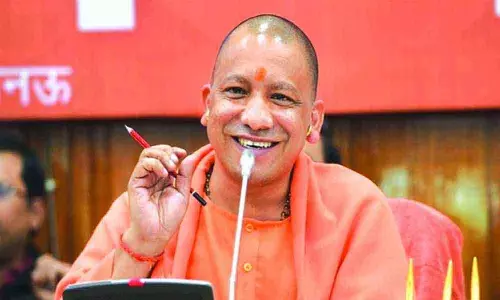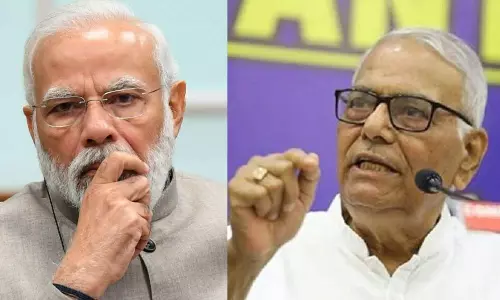
Dec 6 - a day made by greater lie and thousand dead bodies
text_fieldsI'm writing this column as the 6th of December fades into another day. I'm reminded of this day of 1992 when thirty years back the Babri Masjid was destroyed by political villains. A painful day…unleashing turbulence, divides, violence and much more along the strain.
As the well-known historian, Professor Irfan Habib — former chairman of the Indian Council of Historical Research and former Professor of History at the Centre for Advanced Study in History at AMU — had told me, "There wasn't a Hindu or Muslim reaction to the destruction of the Babri Masjid. It also demolished the idea of India. As an Indian, I felt insulted and it was a blow to the image of my country. The destruction of the 475-year-old mosque brought shame and dishonour to the country…It is not a question of Hindu or Muslim but the very destruction was an insult to the country and its citizens. An assault on the Indian secular consciousness. And the then prime minister Narasimha Rao who'd promised to protect the structure had just looked the other way."
Mind you, Professor Irfan Habib had gone on to warn, that such a post-facto rationalization of what was done on 6 December 1992, would place in jeopardy the fate of numerous historical monuments all over the country, an increasing number of which are being targeted for destruction by the communal Right- Wing forces.
The destruction of the Babri Masjid had dragged along offshoots in the form and shape of 'political villains' — the destroyers of that masjid.
In the midst of the political villains, few heroes did stand out. I'm reminded of Abid Surti's book 'In the Name of Rama' (Anhad).Though, as a cartoonist, Surti created 'Dabbuji', 'Bahadur', 'Inspector Vikram' and 'Inspector Azad', but 'In the Name of Rama', the tale revolved around a true life incident that took place during the destruction of the Babri Masjid. As Surti detailed, " This book is inspired by the real story of a police constable who stood alone at the foot of the Babri Masjid against a swirling ocean of kar sevaks…The thought of writing this book hit when I read the eyewitness account of the Babri Masjid demolition in 'The Week' magazine ( 26 December 1992). What caught attention was the story of one policeman. When kar sevaks attacked the Babri Masjid and all security personnel had abandoned their posts, this one constable stood on, all alone against the kar sevaks. He was trampled over by an army of saffron crusaders and it is not known where he is today, whether he is alive or dead… the story is told through a young doctor who is treating the protagonist Ramasray, lying in a coma and attended by his beloved cum caretaker Sumatiya."
Of course, in the background or foreground of Surti's tale was the destruction of the Babri Masjid. To quote him, "There are around 3,000 temples in Ayodhya, including half a dozen that have for decades claimed to be the real Ram Janmabhoomi. Is it justified to build another temple over thousands of dead bodies? Hitler had once said — 'By means of shrewd lies, repeated often enough, it is possible to make people believe that heaven is hell and hell heaven. The greater the lie, the more readily it will be believed.'"
Surti then gently added, "I want this book to remain as a question mark in the face of a collective lie."
ANOTHER SHOCKER!
What can be termed as a series of shockers are reports coming in right from this summer of 2022 of several jailed inmates, imprisoned in the jails of Uttar Pradesh, testing positive for HIV. Some of the HIV infected also tested positive for TB.
Focusing on the news reports published earlier in June, about 22 inmates in the Saharanpur jail tested positive for HIV, and 6 inmates in the Gonda jail. And in early September, 26 inmates of the district jail at Uttar Pradesh's Barabanki tested positive for HIV. News reports stated that the tests were conducted by the health department during a three-phase HIV camp held at the jail from August 10 to September 1, and of the 26 people, two were undergoing anti-retroviral treatment at Ram Manohar Lohia Hospital in Lucknow.
And now, in November, comes news from Ghaziabad situated Dasna Jail - that out of 5,500 inmates 140 are HIV positive and 35 of them also have TB. These are officially released figures, together with this disturbing fact –currently, around 5,500 inmates are lodged in Ghaziabad situated Dasna jail against a capacity of 1,706 inmates.
Mind you, in all probability, they couldn't have been infected when they were initially jailed, because it is mandatory to conduct medical tests before imprisonment.
Relevant queries do come up: How did they did HIV infected in the confines of these jails and prisons? Why weren't medical tests conducted on the prisoners when the initial symptoms came up? What steps are undertaken for deadly infections, including tuberculosis infections, not to further infect many more of the jailed population? What steps are being implemented or undertaken to lessen the overcrowding aspect of jails? Is the concept of open- jails a better option; with prisoners able to breathe fresh air and move about along a larger stretch? Above all, what is the State doing for the under-trials? Technically innocent, as yet to be proven guilty yet they sit languishing for years, if not for decades. Wasted lives with sheer nothingness holding out!
Where are prison diaries and books of the day? Why don't prisoners write, so that we know what's taking place there? Are prisoners of the day discouraged from offloading their everyday experiences or innermost thoughts and emotions? Are the imprisoned men and women reduced to such levels of hopelessness that they don't want to yield the pen or else try to key in, that is, if computers and laptops are even available in the prisons in these 'developed' times? Also, is there that basic freedom for the imprisoned to write fearlessly and freely and in that ongoing way, day after day, in that imprisoned state?
When one thinks of prisoners of today, it gets significant to mention that perhaps prison conditions were relatively better in those years passed by, when books of much significance were written by those sitting imprisoned.























